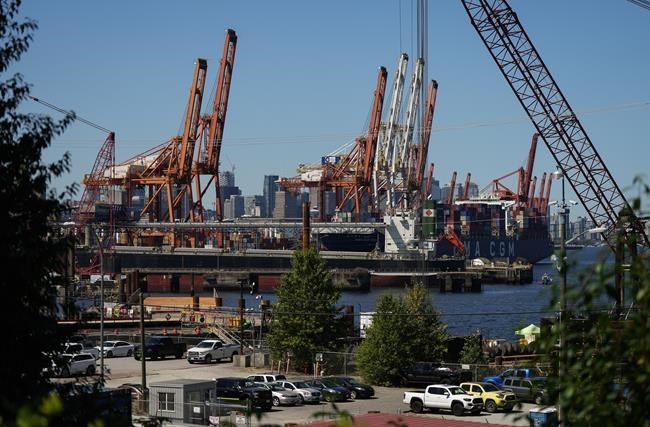VANCOUVER — The union representing about 7,400 workers in the British Columbia port dispute has been warned by the Canada Industrial Relations Board that changing its mind about a new deal during ratification would be an "unfair labour practice."
The board's order issued Sunday also says the International Longshore and Warehouse Union Canada must hold a ratification vote on the deal with employers no later than Friday, and restricts both sides from commenting to the media, beyond a single joint-statement announcing the agreement.
A labour law expert said the order shows the complexity of resolving a dispute involving thousands of union members spread over large areas, who may have differing priorities for a deal.
"Certainly, the union generally tries to avoid a situation where there is a gap between negotiators and their leadership, but it's often the case that there's a gap between those who are negotiating an agreement at the bargaining table and the membership themselves," said Liam McHugh-Russell, assistant professor at Dalhousie University's Schulich School of Law.
Sunday's warning to the union's leadership came after a previous proposed contract was supported by union negotiators, then rejected by leaders before they changed course and recommended it to members — who then sank it in a full vote last week.
"There's the fundamental tension between the workers … and the employer," McHugh-Russell said. "But there's also a tension in terms of what workers themselves want, and there's a difficulty for the union in ensuring that all of those voices and interests get represented at the table."
The union and the BC Maritime Employers Association announced a late-night breakthrough Sunday, saying in their joint statement they had reached a new negotiated agreement and would be recommending it to their members.
The joint statement said the new tentative deal was reached with the assistance of the industrial relations board.
The long-running dispute saw workers walk off the job at more than 30 port terminals and other sites for 13 days at the beginning of July, freezing the movement of billions of dollars worth of cargo in and out of some of Canada's busiest ports.
McHugh-Russell said while the joint statement sounds promising, the union's full membership vote could reject the latest proposal.
He said the challenge now for the union is to pull together the diverging voices and priorities within its membership — something it couldn't achieve ahead of last week's vote on the previous proposed contract.
"There is always some conflict and tension within bargaining units," McHugh-Russell said. "No two people ever want the exact same thing from their employers. Employees with kids often want better dental plans, and employees without kids might prefer to have a slightly bigger raise.
"What we see playing out here is an example of internal tensions of a group of people, all trying to bargain collectively."
Given the possible changes in the new agreement, McHugh-Russell said there's now also the small possibility that individual employers represented by the BCMEA may not be completely satisfied — adding another level of uncertainty.
He said every time a deal hammered out at the table gets rejected by union members, it damages the credibility of negotiators and ultimately weakens the union's bargaining position.
"It makes it harder to reach a deal, because both sides can't be sure what they are saying at the table is going to stick when it comes to asking for the membership to sign off on it," McHugh-Russell said. "The stakes are high for everyone."
After the previous deal was voted down last week, Labour Minister Seamus O'Regan announced Saturday he was directing the industrial relations board to determine if a negotiated end to the dispute was still possible, and if not, to impose an agreement or final binding arbitration.
The industrial relations board's order on Sunday said that if the new deal is voted down by members of either side, both the union and the employers will have two days to address O'Regan's question whether a negotiated end to the conflict can still be achieved.
Pressure had been mounting for federal intervention if a deal failed to eventuate.
Parties including Alberta Premier Danielle Smith, the Business Council of Canada and the Canadian Federation of Independent Business have all urged the federal government to legislate an end to the dispute if it continued.
The industrial relations board's order, posted online, also says the union must not engage in strike activity, and the employers must not conduct a lockout, until after the ratification results are known.
It also orders both sides not to speak publicly about details of the new agreement until both sides have completed their ratification votes.
This report by The Canadian Press was first published July 31, 2023.
Chuck Chiang, The Canadian Press




